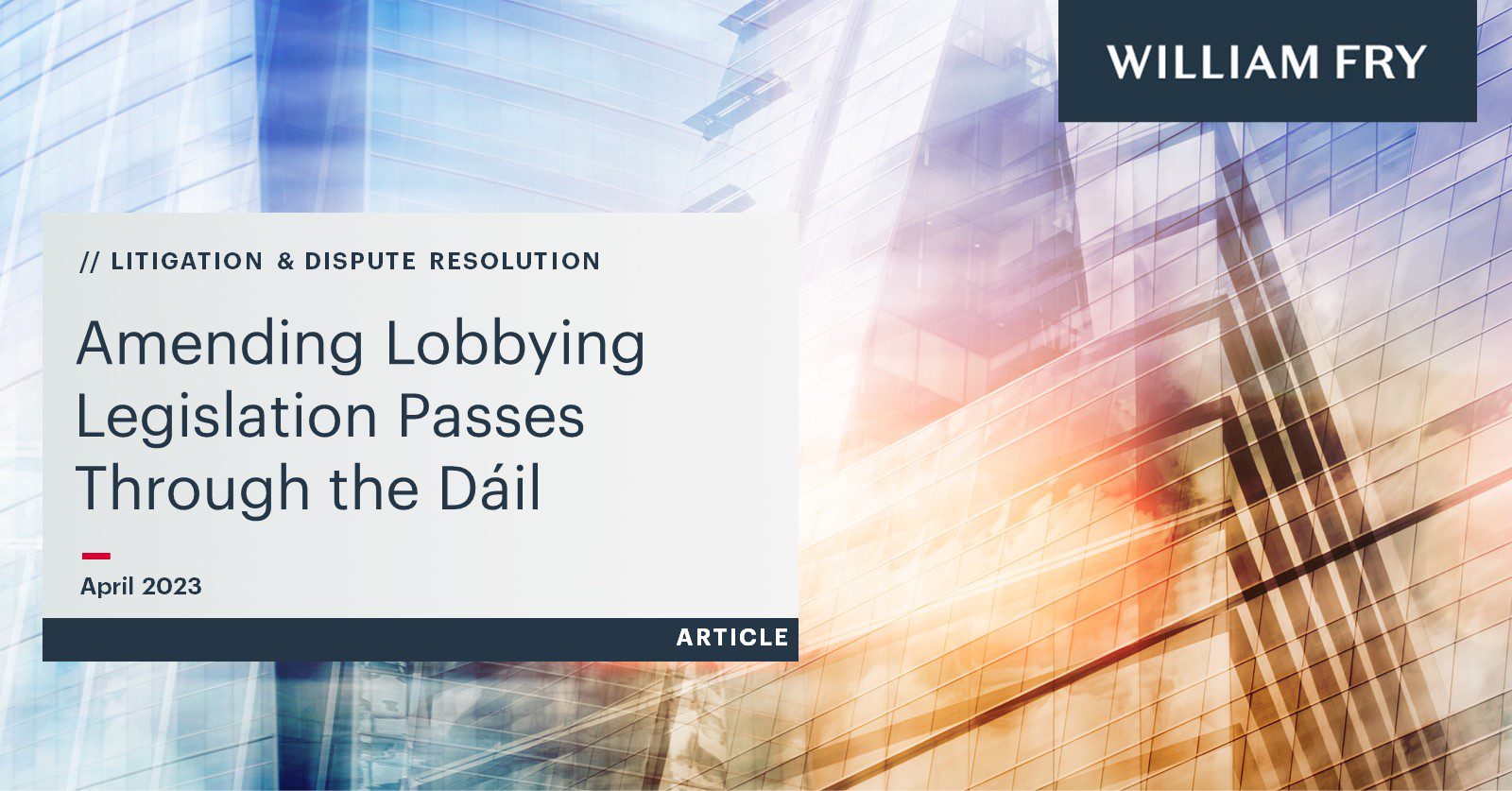The Regulation of Lobbying (Amendment) Bill 2022 (Bill) has passed all stages of the Dáil. It is currently before the Seanad for consideration.
The Bill seeks to amend the Regulation of Lobbying Act 2015 (Principal Act), which established a statutory regime for lobbying activity in Ireland. The Principal Act obligates lobbyists to register on the Lobbying Register and enter regular returns about their lobbying activity, including which designated public official (DPO) they have engaged, when and for what purpose. The regime is administered by the Standards in Public Office Commission (Commission).
The Bill aims to strengthen the Principal Act by closing existing loopholes and increasing transparency. The key amendments are discussed below.
1. Amendments to the scope of the Principal Act
The application of the Act is to be extended to include bodies with no employees which primarily exist to represent the interests of their members or to advocate for particular issues, such as informal business groups. The definition of lobbying activities is also to be extended in relation to the development or zoning of land so that it includes the managing and direction of relevant communications and the making of relevant communications.
It is purported to close a loophole in the scope of the Principal Act. Currently, where lobbying activity is conducted by unremunerated directors, rather than paid employees this falls outside the scope of the Principal Act. It is proposed to bring an office holder who conducts lobbying activities, regardless of whether the office holder is renumerated, into scope.
It is also proposed to introduce an exemption for communications made by a political party to its members where the communication was made to the member in their capacity as member of the party.
2. Amendments to registration
It is purported that persons applying for inclusion on the Lobbying Register will have to, if applicable, provide the address where they conduct their “main activities” and the name of every person who is a member of an informal business group. Registered persons will also have to provide the name of every member of an informal business group when making a return and inform the Commission, as soon as possible, of any change in their registration information.
3. Amendments to ‘cooling-off’ provisions
The Bill aims to improve compliance with the ”cooling-off” provisions in the Principal Act. The ”cooling-off” provisions currently restrict former relevant DPOs from conducting specific lobbying activities for one-year following employment as a lobbyist, without the Commission’s consent.
It is proposed to strengthen this restriction by adding that relevant DPOs must abide by any conditions attaching to the Commission’s consent and by requiring public service bodies to a) inform relevant DPOs joining and leaving their organisations of the relevant DPO’s obligations regarding applications for consent and b) provide the Commission with the details of a relevant DPO as soon as possible after becoming aware that they are to leave the organisation.
4. Introduction of new sanctions and sanctions regime
It is purported to introduce the following new contraventions:
- Carrying on lobbying activities while one’s registration is marked as having ceased.
- Taking action to avoid obligations concerning registration or returns (while this will remain an offence under the Principal Act, an administrative sanction and a criminal liability cannot be imposed for the same action).
- Failing to apply for the Commission’s consent to take up a specific position or employment during the 12-month “cooling-off” period after leaving a position as a relevant DPO.
It is also purported to establish a new sanctions regime (SR). It is proposed to amend section 22 of the Principal Act to make the contravention of the post-term employment restrictions, and the contravention of taking actions to avoid making returns or registrations, subject to a civil/ administrative sanction.
If established, the Commission will administer the SR. It is proposed that the Commission will have the power to carry out investigations, including conducting oral hearings, and impose minor sanctions (any combination of advice, caution, or reprimand) and major sanctions (a penalty of up to €25,0000 and /or a prohibition from lobbying for up to two years).
It is also proposed to introduce a right of appeal to the Circuit Court from the imposition of a sanction. Where the decision to impose a major sanction has not been appealed, the Commission must apply for Circuit Court approval of the decision.
The Commission will be required to publish a code for the conduct of investigations and a code for the conduct of proceedings relating to the SR. The Bill also empowers the Commission to introduce regulations relating to the SR.
We will continue to monitor the Bill as it progresses through the Seanad. For further information please contact Laura Murdock, Sarah Twohig or your usual William Fry contact.
Contributed by Orla Trant


